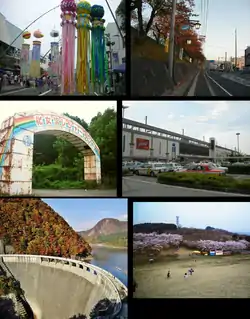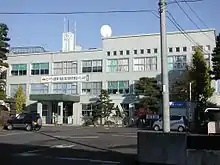Ōsaki, Miyagi
Ōsaki (大崎市, Ōsaki-shi) is a city located in Miyagi Prefecture, Japan. As of 1 May 2020, the city had an estimated population of 128,763 in 51,567 households,[1] and a population density of 160 persons per km². The total area of the city is 796.76 square kilometres (307.63 sq mi). Ōsaki is a member of the World Health Organization’s Alliance for Healthy Cities (AFHC).[2]
Ōsaki
大崎市 | |
|---|---|
 upper:Furukawa festival, Kashima-dai middle:Kejonuma Leisure Land, Furukawa Station lower:Naruko Dam, Mount Kagoho | |
 Flag  Seal | |
 Location of Ōsaki in Miyagi Prefecture | |
 Ōsaki | |
| Coordinates: 38°34′37.6″N 140°57′20.1″E | |
| Country | Japan |
| Region | Tōhoku |
| Prefecture | Miyagi |
| Government | |
| • Mayor | Yasushi Ito |
| Area | |
| • Total | 796.76 km2 (307.63 sq mi) |
| Population (May 1, 2020) | |
| • Total | 128,763 |
| • Density | 160/km2 (420/sq mi) |
| Time zone | UTC+9 (Japan Standard Time) |
| - Tree | Rose |
| - Flower | Flowering Dogwood |
| Phone number | 0229-23-2111 |
| Address | 1-1 Furukawa Nanokamachi, Ōsaki-shi, Miyagi-ken 989-6188 |
| Website | Official website |

Geography
Ōsaki is in north-central Miyagi Prefecture in the northern Sendai Plain. The Furukawa area in the center of the city is a base for commercial and service industries in the northern portion of Miyagi Prefecture, and the Naruko area in the northwestern of the city is noted for hot spring tourism . The Kashimadai and Matsuyama districts in the southeastern part of the city are within the commuting zone of Sendai.
Climate
Ōsaki has a maritime climate (Köppen climate classification Cfa) characterized by mild summers and cold winters. The average annual temperature in Ōsaki is 11.5 °C. The average annual rainfall is 1249 mm with September as the wettest month. The temperatures are highest on average in August, at around 24.4 °C, and lowest in January, at around -0.6 °C.[3]
Demographics
Per Japanese census data,[4] the population of Ōsaki has remained relatively steady over the past 60 years.
| Year | Pop. | ±% |
|---|---|---|
| 1960 | 138,978 | — |
| 1970 | 126,057 | −9.3% |
| 1980 | 130,266 | +3.3% |
| 1990 | 135,208 | +3.8% |
| 2000 | 139,313 | +3.0% |
| 2010 | 135,147 | −3.0% |
History
The area of present-day Ōsaki was part of ancient Mutsu Province, and has been settled since at least the Jōmon period by the Emishi people. During the Nara period, gold was discovered in the area. During later portion of the Heian period, the area was ruled by the Northern Fujiwara. During the Sengoku period, the area was contested by various samurai clans before the area came under the control of the Date clan of Sendai Domain during the Edo period, under the Tokugawa shogunate.
The town of Furukawa was established with the creation of the modern municipalities system on April 1, 1889. It was raised to city status on December 15, 1950.
The city of Ōsaki was established on March 31, 2006, from the merger of the city of Furukawa absorbed the towns of Iwadeyama and Naruko (both from Tamatsukuri District), the towns of Kashimadai, Matsuyama and Sanbongi (all from Shida District), and the town of Tajiri (from Tōda District).
Government
Ōsaki has a mayor-council form of government with a directly elected mayor and a unicameral city legislature of 30 members. Ōsaki contributes four seats to the Miyagi Prefectural legislature. In terms of national politics, the city is part of Miyagi 6th district of the lower house of the Diet of Japan.
Economy
The economy of Ōsaki is largely based on agriculture, primarily the cultivation of rice and soybeans. Industry includes electronics, precision machining and construction materials.
Education
- Miyagi Seishin Junior College
- Ōsaki has 25 elementary public schools and 10 public junior high schools operated by the city government. There are five public high schools, and two combined public middle/high schools operated by the Miyagi Prefectural Board of Education and two private high schools and one combined private middle/high school. The prefecture also operates one special education school for the handicapped.
Transportation
Railway
![]() East Japan Railway Company (JR East) - Tōhoku Shinkansen
East Japan Railway Company (JR East) - Tōhoku Shinkansen
![]() East Japan Railway Company (JR East) - Tōhoku Main Line
East Japan Railway Company (JR East) - Tōhoku Main Line
![]() East Japan Railway Company (JR East) - Rikuu East Line
East Japan Railway Company (JR East) - Rikuu East Line
Highway
.png.webp) Tōhoku Expressway - Furukawa IC; Chōjahara PA
Tōhoku Expressway - Furukawa IC; Chōjahara PA National Route 4
National Route 4 National Route 47
National Route 47 National Route 108
National Route 108 National Route 346
National Route 346 National Route 347
National Route 347 National Route 457
National Route 457
Local attractions
- Yūbikan, former Date clan school and gardens; registered National Historic Site an Place of Scenic Beauty [5]
- Miyazawa Site, ruins of early Heian-period fort; National Historic Site
- Yamahata Cave Tomb Cluster, National Historic Site
- Daikichiyama Tile Kiln Site, National Historic Site
- Nakazawame Shell Mound, National Historic Site
- Kido Tile Kiln Site, National Historic Site
- Myōdate Kanga ruins, National Historic Site
- Dewa Sendai Kaidō Nakayamagoe Pass, National Historic Site
Sister city relations
 - Middletown, Ohio, USA, since October 18, 1990[6]
- Middletown, Ohio, USA, since October 18, 1990[6] - Jinshui District, Zhengzhou, Henan Province, China,[7] since July 19, 1994
- Jinshui District, Zhengzhou, Henan Province, China,[7] since July 19, 1994 - Dublin, Georgia, USA, since May 29, 1998
- Dublin, Georgia, USA, since May 29, 1998
Noted people from Ōsaki
- Sakuzō Yoshino, author
- Shinji Yoshino, politician, cabinet minister
- Frank Nagai, singer
- Ryōji Chūbachi, businessman
- Naoko Fujioka, female professional boxer
References
- Ōsaki city official statistics(in Japanese)
- Alliance for Healthy Cities official home page
- Ōsaki climate data
- Ōsaki population statistics
- "旧有備館および庭園". Agency for Cultural Affairs. Retrieved 10 February 2012.
- Kunkle, Tara (March 25, 2009). "Middletown Sister Cities With Furukawa/Osaki City". Middletown Community News. Middletown USA official home page. Retrieved 19 December 2015.
- "International Exchange". List of Affiliation Partners within Prefectures. Council of Local Authorities for International Relations (CLAIR). Retrieved 21 November 2015.